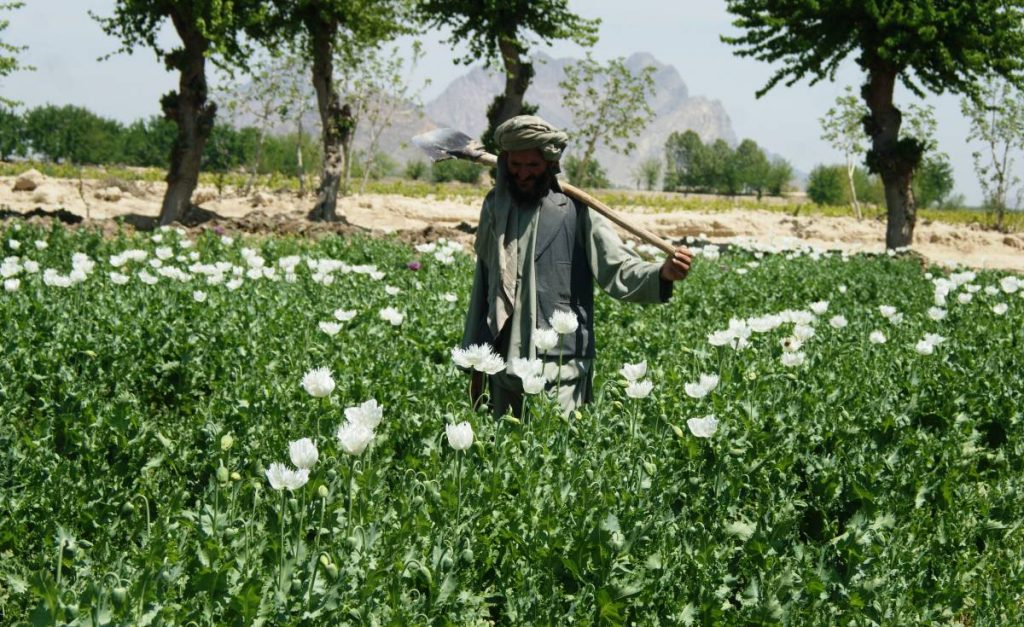Hundreds of hectares of poppy farms have been smashed across Badakhshan over the past two months…reports Asian Lite News
Afghan counter-narcotic police have destroyed poppy farms on 123 acre of land in northern Badakhshan province, Provincial Director for Information and Culture Qari Maazudin Ahmadi said.
The illegal crop, according to the official, has been destroyed around the provincial capital Faizabad city and adjoining areas over the past couple of days.
Hundreds of hectares of poppy farms have been smashed across Badakhshan over the past two months, the official said pon Wednesday, adding police won’t allow anyone to cultivate poppy or other illegal crops in the province.
Afghan counter-narcotic police have accelerated the poppy eradication campaign as police personnel has destroyed 80 acre of poppy farms in the northern Jawzjan province since early May, Xinhua news agency reported.

Mullah Hibatullah Akhundzada, the supreme leader of the Afghan caretaker administration, issued a decree in April last year to ban the cultivation of illegal crops, including poppy, and drug processing and trafficking.
Earlier in May, the counter-narcotics department of the Taliban-led Ministry of Interior (MoI) said that it destroyed 4,000 hectares of poppy fields in the country.
Head of the Taliban-led MoI, Hasibullah Ahmadi, said the process of destroying poppy fields is ongoing in Badakhshan, Kunduz, Takhar and Faryab provinces. “About 4000 thousand hectares of land have been cleared of drug cultivation in the center and provinces of the country,” Ahmadi noted, according to Tolo News.
As per the Kabul Security Command, after the Taliban returned to power, more than 1,000 people were arrested in connection with drug trafficking and its sales in the capital.
“1000 suspects have been arrested and turned over to the law in Kabul. These were the narcotics sellers and smugglers,” said Kabul security department spokesman Khalid Zadran, according to Tolo News.
Some farmers whose poppy fields have been destroyed asked the current government to provide them with alternative crops.
“We ask the current government to provide us with an alternative to opium cultivation and help us because our children are dying of hunger,” said Wali Mohammad, a resident of Uruzgan.
The Taliban-led Ministry of Interior (MoI)’s counter-narcotics department said that based on the surveys of recent years, there are between 3.5 million and four million drug users in the nation. The MoI has recently begun a new survey on the matter.
In a separate incident in May, at least four farmers died, and five others were injured in a dispute over the poppy field destruction in the northeastern Darayim district of Badakhshan province of Afghanistan.
The incident took place in the hamlet of Doabe Tagab in the Badakhshan region’s Darayim district, when the Taliban troops reportedly arrived to burn the locals’ paddy fields. A disagreement developed when the farmers demanded payback for the money invested in their lands. As a result, farmers came under fire from Taliban forces, resulting in four deaths and five injuries.
Another local source claimed that 15 people were harmed in the altercation, including the district commander and six additional Taliban members, reported Khaama Press.
The locals, horrified by the Taliban’s actions, demanded that those responsible be brought to justice. On the other hand, the Taliban were seen establishing a roadblock in the area out of concern about a local uprising.
According to a UN Office on Drugs and Crime (UNODC) report, opium cultivation in Afghanistan has increased by 32 per cent over the previous year to 233,000 hectares since the Taliban’s takeover in August 2021, making the 2022 crop the third-largest area under opium cultivation since monitoring began, Khaama Press reported.
Conversely, opium prices have skyrocketed in Afghanistan since the Taliban imposed the ban on cultivation in April 2022.

